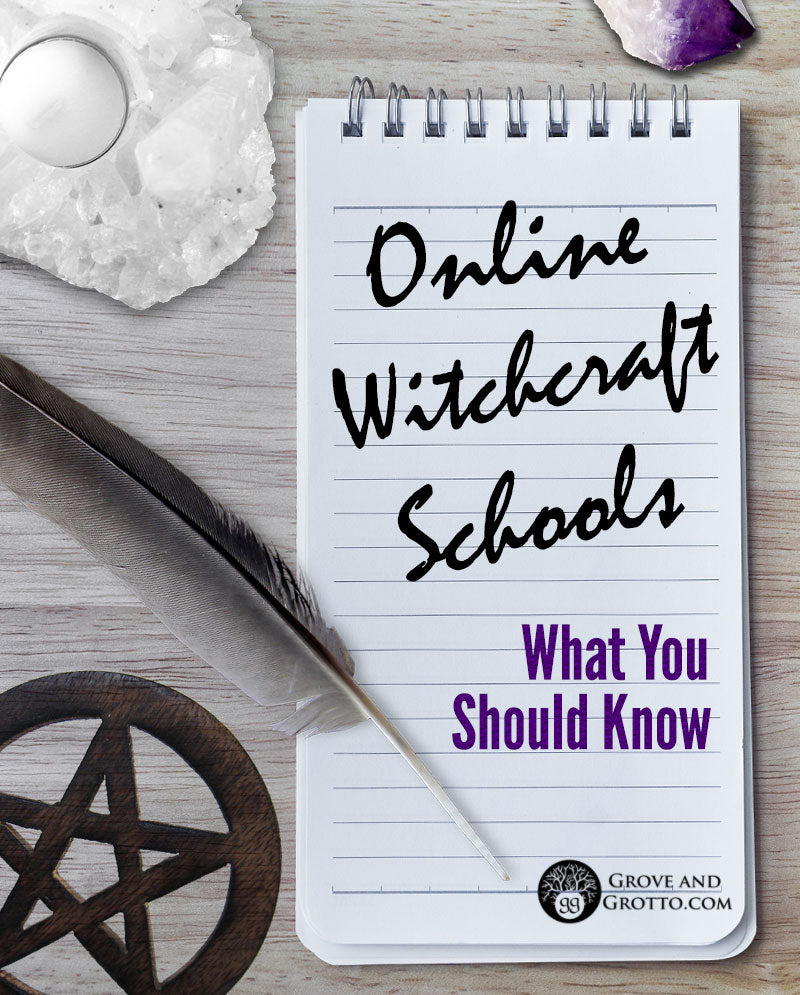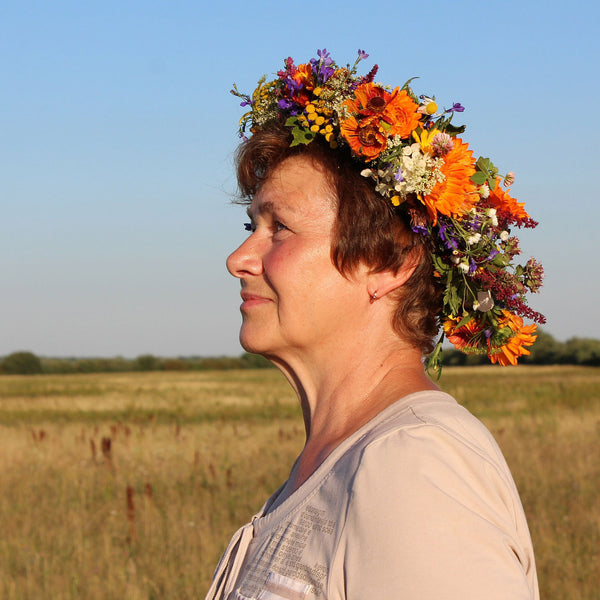
Thinking about deepening your witchcraft studies by attending school? Welcome to the future—it’s pretty amazing here! One of the blessings of the information age is that it is easier than ever to connect with a teacher, especially in arcane subject matter that was once available only to a select few.
Most witchcraft schools exist primarily in the online sphere, where rent is cheap and information can flow freely across distances. Online education has some disadvantages compared to face-to-face instruction. You will likely complete your studies by downloading lessons and interacting with your teacher(s) over email, video, and forums. (Hogwarts, it ain’t.) Discipline and strong communication skills will be required to stay engaged when learning at home.
When you are deciding on a school of witchcraft, you’ll want to gather as much information as possible. Formal training in witchcraft can require a significant outlay of both time and money. So it’s important to weigh your options and make a decision that will serve you well in your quest for learning.
Finding a qualified teacher is only part of it. You’ll also need to find a good match for the path that you’re on. If something doesn't look right or feel right, keep looking. Each school has a different focus and different merits—see the end of this article for a list of popular online schools.
The schools’ founders and instructors should be able to answer specific inquiries about payment and course content. However, the most informative questions are always the ones that you ask of yourself. For instance, Why are you doing this, what do you seek to gain, and what are you willing to invest?
Here are five questions you’ll want to answer for yourself—or at least spend a moment considering—before you click “enroll”:
1. Why do you want to attend a witchcraft school?

There are many reasons to seek instruction in the magickal arts. Some common reasons are discussed below. Which of these motivations apply to you, and what other ones can you think of?
It’s a good idea to spend some time meditating or journaling about what is driving you to seek a school of witchcraft. Really try and be honest with yourself! It will be easier to make informed choices regarding your witchcraft education if you are in touch with your reasons for desiring that education.
There are no really “good” or “bad” reasons for wanting to work with a teacher…what’s important is that you are happy with your decisions and the outcome of those decisions.
Here are some of the reasons that attract thousands of people to online witchcraft schools:
To be in a community with others.
Witchcraft can be a lonely path. Lots of Witches enroll in school not to be taught, so much as to meet up with fellow travelers. It feels amazing to be introduced to a group of people that understands the “whys” of witchcraft. You can share stories, get advice, celebrate festival days, and enliven your solitary practice with the joy of community.
Many Witches believe that online interactions are no substitute for experiencing training and rituals face-to-face, and there is some validity to that point of view. Still, for the very shy or geographically isolated person, joining an online group can be world-changing.
To develop and control psychic abilities.
Psychic abilities and paranormal experiences are more common than many people believe. When they manifest uncontrollably, they can be a disruptive influence on your mundane existence. On the other hand, learning to harness these abilities can improve your life in powerful ways.
Witches and Pagans belong to one of the only subcultures that talks openly about psychic phenomena. One of the missions of the Witch is to propagate the mental/spiritual technologies that make empathy, telepathy, clairvoyance, and precognition both useful and bearable.
Some paths emphasize psychic development more than others. You can always supplement a comprehensive witchcraft course with extra classes on psychic protection, divination, etc.
To learn aspects of witchcraft that can’t be found in books.
There are excellent books available on most occult topics, and—due to the scarcity of good teachers—many Witches have years of self-study behind them. Yet there may come a time when you wish to study magick that’s not easily conveyed through the written word.
Advanced energy work, spirit and deity possession, folk magick—these are disciplines that are traditionally passed from teacher to student. They’re just easier (and safer) to learn under the guidance of somebody else. That’s not to say reading about these things is a waste of time. You can accelerate your studies by applying your previous book-learning to your classroom experience.
To become a Wiccan/Pagan/interfaith minister.
Some witchcraft schools will offer to make you a priest or priestess upon graduation. Those titles have meaning within the tradition…but they don’t generally confer the legal status that applies to ordained ministers.
If you’re called to serve the Pagan community as clergy, it’s advisable to seek a school that offers a path to ordination. Though there is some overlap, Pagan and interfaith priesthood calls upon a different set of skills than being a solitary Witch. Trained ministers can perform weddings and handfastings, bury the dead, visit the sick and incarcerated, perform cleansings and blessings, counsel the bereaved, make mental health referrals, and lead the community in ritual. It’s a big responsibility and requirements for ordination vary by state. Cherry Hill Seminary is a great resource for learning more about Pagan and Earth-based ministries.
To impress people, or to obtain an initiation, degree, or certificate.
Most people would say that seeking recognition is a lousy reason to go to witch school. But that’s not necessarily true. As Witches, we do our best to keep our egos in balance, but we do not repudiate pride as a sin. Completing a course of study is an accomplishment, and it’s okay to crave some concrete evidence of that accomplishment.
Initiation is a sticky subject in witchcraft communities. Given the narrow reach of most witchcraft organizations, it’s reasonable to assume that most practicing Witches were self-initiated. Many of these people are learned and powerful masters of their Craft all the same. (On rank: A first-degree priestess can embody the Goddess with power and grace, and a third-degree can act like a big baby. When it comes to wisdom and character, degrees and titles and lineages don’t mean crap.)
Yet it is a fact that certain witchcraft traditions do not recognize self-initiations, and some Witches look down upon the self-initiated. Some certifications and titles require the endorsement of a qualified teacher. Even within traditions that allow self-initiation, degrees require service within a coven structure and are not self-assigned. That “solitary self-initiated third-degree priestess” that shows up at your local Pagan Night Out is stretching the definition of the words just a little bit.
To summarize: Initiatory experiences can be powerfully transformative, but they’re not necessary to engage deeply with your magickal practice. It’s natural to seek status, but if that’s your only reason for enrolling in a witchcraft school, you need to reconsider your motives.
Remember: People who don’t love and respect you before you’re a Certified Bonafide High-Falutin' Whatever probably won’t respect you afterwards, either. Degrees and titles are artifacts of this world. They reflect time and dedication, but they’re not a reliable measure of spiritual power or progress.
3. What skills do you want/expect to learn?

Witchcraft encompasses a wide variety of skills and practices. No doubt some of them are more relevant to you than others. Some common course topics include: Spell-casting, the history of Witchcraft, psychic development, herbs and oils, color magick, energy work, spirit communication, altars and sacred space, gods and goddesses, seasonal rites, astrology, sexual magick, divination, past-life discovery, Fae and elementals, ancestor work, spiritual protection, alternative healing, Tarot and runes, correspondences, making tools, and writing and performing rituals.
If that sounds like a lot, it is! Most beginner classes will merely touch on most of these subjects, leaving the student to seek out more in-depth knowledge on their own.
When shopping for a witchcraft school, try making a list of, say, four or five topics that you’re most interested in learning about. Then, compare it against the lesson plan outlines offered by the various schools. If you desire intensive instruction in one particular area, see if the instructor can provide recommendations for continuing your studies after graduation.
Try to stay receptive to all the information offered in the class, even if it’s not your strongest subject. A well-rounded Witch is a powerful Witch, and you just might discover a new favorite flavor of magick!
3. What tradition(s) do you most connect with?

As a beginner, you may already know which magickal traditions, pantheons, and styles of witchcraft appeal to your spirit. Or you may be totally overwhelmed by the number of options available. Ceremonial magick, nature magick, spiritualism, shamanism, Faery, Celtic Paganism, Northern European traditions, American Hoodoo/rootwork, Italian witchcraft, Hebrew Kabbalah, Native American spirituality, African diaspora traditions, Chaos and postmodern magick, movies and television, fantasy fiction, and the New Age movement have all left their mark on how witchcraft is taught in schools.
Wicca and Wicca-influenced traditions tend to dominate online course offerings. Wicca provided the degree-based initiatory model (borrowed in turn from Freemasonry) that has been adopted successfully into many modern traditions. Wicca also teaches a solid foundation of basic occult skills, reverence for nature, and observation of Earth’s seasons that can benefit any Witch who studies them.
But Wicca doesn’t serve everyone equally. Wicca has long been criticized for being historically inaccurate, Eurocentric, and white-dominated. The number of atheist or agnostic Witches is growing, and some of them take issue with Wicca’s emphasis on deity. And—with its central rite being the union of a God and Goddess—the gender politics of Wicca are rapidly becoming uncool.
So what’s a progressive Witch to do? With a little searching, you can find smaller, more specialized schools (or even individual instructors) who are teaching outside of the Wiccan and traditional witchcraft paradigms. Or, you can enroll in one of the big witchcraft schools, taking what learning you will from one of the many expert Wiccan-identified teachers.
It’s not expected that you will agree with the teacher or course materials on everything. Witchcraft is a path that emphasizes autonomy. In the end, you will likely adapt what you have learned to your individual needs and worldview, and discard anything that doesn’t work for you. Witches are famously eclectic in our spirituality. It might not be possible to find a school that completely aligns with your beliefs.
It's also helpful to remember that seeking instruction (or even initiation) in one tradition doesn’t usually preclude your later involvement with another tradition of your choice. It’s normal for your spiritual path continues to broaden and evolve even after you “finish” school.
4. What’s your budget?

Online witchcraft schools usually charge a fee to cover the instructor’s time and the cost of producing class materials. While there are some opportunistic people who charge exorbitant fees for instruction and initiation, that’s rare. Most online witchcraft schools charge tuition that is comparable to a gym membership or educational software subscription, somewhere around $25 per month. Some are registered as non-profits. Still, that doesn’t mean that witchcraft school is a good value for everyone.
When budgeting for tuition, read the terms and conditions and make sure you understand what is included in the cost. Will you receive downloadable course materials, forum access, one-on-one time with the instructor, graduation or initiation? What happens to your account if you miss a payment or become inactive? What if you change your mind after one lesson? How long has the school been in business? Check out the cancellation and refund policy, too. It’s a good idea to seek out reviews or testimonials from current and former students to make sure the online school is delivering on its promises.
Also consider what supplementary materials are recommended or required. The teacher should be able to provide you with a list of books and tools for the class. (It’s a red flag if a teacher requires you to buy all their books or digital content, use affiliate links, or make expensive purchases of materials and supplies.)
How about travel? It’s usually not required when you’re taking an online course. However, you may wish to travel in connection with your studies—to receive initiation, visit sacred sites, meet other students, or attend school events. If travel will be part of your education, be sure to build it into your budget.
Taking a quick glance around the internet, we’ve seen that the leading introductory witchcraft courses cost about $250-350. That’s for the first year, without any optional books, equipment, consultations, or travel.
If you’ve got sticker shock, there are alternatives to enrolling in a witchcraft school. I recommend obtaining (and working along with) a good beginner’s book for a period of at least a year. Classics of the genre include Raymond Buckland’s Complete Book of Witchcraft (affectionately nicknamed “Big Blue”) and Modern Magick by Donald Michael Kraig. Each of these titles has hundreds of thousands of copies in print. Beginner’s books can be found for free at many libraries, or at a very low cost in used bookstores and online.
For the frugal Witch, $300 is more than enough money to assemble a basic occult library and a small (but totally serviceable) toolkit of ritual items. If you are very self-directed, you could use a combination of books, at-home practice, and community resources (like public rituals and internet discussion groups) to cobble together a first-year course of study for next to nothing.
5. How long will it take you to finish?

A wise Witch never stops learning. However, it’s reasonable to expect that a formal class will have a tentative graduation date to put on your calendar. You’ll also need to consider how the coursework will fit into your daily or weekly schedule.
The school’s website or prospectus should let you know what kind of participation is expected. You will probably have a combination of reading assignments, audio or video content, journaling, forums and group chats, quizzes, and at-home exercises to complete. The time commitment will vary based on the school and your previous experience with the material. But…five to seven hours per week is probably the minimum time needed by the dedicated student of witchcraft.
What if you get too busy to keep up? Life happens, after all. Many online classes are self-paced, meaning you can take as long as you want to complete the course materials. It also means that the more you procrastinate, the more the class will end up costing altogether. So, it makes economic sense to wait to enroll until you can devote the time to completing the required work. Magick rewards consistency: Try to stick to a short daily practice, even if you must put the remainder of the coursework on hold.
Many newbies are eager to complete their witchcraft studies, and that’s awesome! However, don’t be tempted to rush through it. The changes effected by magickal study take some time to integrate themselves in your mind, body, and energy field. There’s a lot to learn and contemplate—not to mention let go of. Ultimately, you will get out of any class what you are willing to put into it.
Reputable schools require at least a year and a day of study for each degree (or equivalent) that is obtained. Beware of schools that are willing to accelerate your graduation/initiation day in exchange for cash.
Enrolling in a witchcraft school can open the door to new contacts, creating opportunities to learn and grow rapidly in your Craft. Why not take the next step and visit some schools?
Legal info: Links are provided for information purposes only. Grove and Grotto LLC does endorse any schools, nor do we receive compensation for including them in this guide.
The leading provider of higher education and practical training in Pagan and Earth-based ministry. Online college offers Masters degrees in Pagan Studies and Divinity, as well as various courses and certifications for non-degree students.
The College of the Sacred Mists
Online college (non-accredited) offering training and ordination with the Wiccan tradition. Introductory courses are available, along with in-depth classes on topics including Pagan history, spellcraft, herbalism, and Reiki.
Online school offering instruction in witchcraft, divination, Reiki, and Southern Conjure. Downloadable lessons and member-only forums guide students in learning basic and advanced magickal skills.
Temple of Witchcraft Mystery School
Witchcraft school with online and in-person options. The Temple's Mystery School consists of five one-year courses which correspond to the Temple of Witchcraft books by Christopher Penczak.
This institution is the oldest of the online witchcraft schools. It boasts more than 125 different courses and offers initiation in the Corellian tradition of Wicca. WitchSchool has a busy forum and Facebook community and low membership fees. The public-facing areas of the website are very out-of-date.
Check out more articles in the archive!
